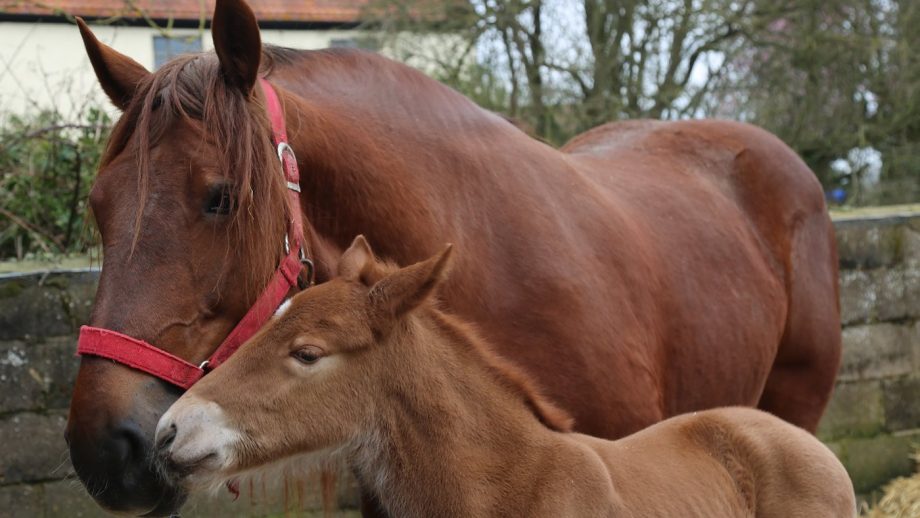A foal has been cloned from a stallion who died decades ago, in hope this species will not become extinct. H&H finds out why increasing genetic diversity is essential for survival and what this technology could mean...
THE birth of a Przewalski’s horse as a way of re-introducing diversity into the species’ gene pool is an example of the way cloning can benefit conservation and prevent extinction, experts believe.
Kurt, the first successfully cloned endangered Przewalski’s horse, was born in Texas, US, on 6 August. He is the clone of a “genetically important” UK-born stallion, cells from whom had been stored at the San Diego Zoo’s “frozen zoo” tissue bank since 1980.
{"content":"PHA+UmV2aXZlICZhbXA7IFJlc3RvcmUsIHdoaWNoIHByb21vdGVzIHRoZSB1c2Ugb2YgYmlvdGVjaG5vbG9neSBpbiBjb25zZXJ2YXRpb24sIHdvcmtlZCB3aXRoIHRoZSB6b28gYW5kIGNsb25pbmcgZmlybSBWaWFHZW4gRXF1aW5lIG9uIHRoZSBwcm9qZWN0LjwvcD4KPHA+Q28tZm91bmRlciBSeWFuIFBoZWxhbiB0b2xkIDxlbT5IJmFtcDtIPC9lbT4gdGhlIGFpbSBpcyB0byBwcmVzZXJ2ZSB0aGUgUHJ6ZXdhbHNraeKAmXMgaG9yc2UsIGEgc2VwYXJhdGUgc3BlY2llcyBvZiB3aGljaCBzb21lIDIsMDAwIGluZGl2aWR1YWxzIHN1cnZpdmUsIGZyb20gMTIgcmVzY3VlZCBmcm9tIGV4dGluY3Rpb24gZWFybHkgbGFzdCBjZW50dXJ5LjwvcD4KPHA+4oCcV2XigJl2ZSBnb25lIGJhY2sgYXQgbGVhc3QgNDAgeWVhcnMgdG8gY3JlYXRlIGdyZWF0ZXIgZ2VuZXRpYyBkaXZlcnNpdHk7IGl04oCZcyBhcyBpZiBhbGwgdGhlIGluYnJlZWRpbmcgb2YgdGhhdCB0aW1lIGNhbiBiZSByZXNldCzigJ0gc2hlIHNhaWQuIOKAnFRoZSBob3BlIGlzIHRoYXQgdGhpcyBmb2FsIHdpbGwgYmVjb21lIGEgYnJlZWRpbmcgc3RhbGxpb24gYW5kIGNhbiBjb250cmlidXRlIHRvIHRoZSBwb3B1bGF0aW9uLuKAnTwvcD4KPHA+PGRpdiBjbGFzcz0iYWQtY29udGFpbmVyIGFkLWNvbnRhaW5lci0tbW9iaWxlIj48ZGl2IGlkPSJwb3N0LWlubGluZS0yIiBjbGFzcz0iaXBjLWFkdmVydCI+PC9kaXY+PC9kaXY+PHNlY3Rpb24gaWQ9ImVtYmVkX2NvZGUtMzEiIGNsYXNzPSJoaWRkZW4tbWQgaGlkZGVuLWxnIHMtY29udGFpbmVyIHN0aWNreS1hbmNob3IgaGlkZS13aWRnZXQtdGl0bGUgd2lkZ2V0X2VtYmVkX2NvZGUgcHJlbWl1bV9pbmxpbmVfMiI+PHNlY3Rpb24gY2xhc3M9InMtY29udGFpbmVyIGxpc3RpbmctLXNpbmdsZSBsaXN0aW5nLS1zaW5nbGUtc2hhcmV0aHJvdWdoIGltYWdlLWFzcGVjdC1sYW5kc2NhcGUgZGVmYXVsdCBzaGFyZXRocm91Z2gtYWQgc2hhcmV0aHJvdWdoLWFkLWhpZGRlbiI+DQogIDxkaXYgY2xhc3M9InMtY29udGFpbmVyX19pbm5lciI+DQogICAgPHVsPg0KICAgICAgPGxpIGlkPSJuYXRpdmUtY29udGVudC1tb2JpbGUiIGNsYXNzPSJsaXN0aW5nLWl0ZW0iPg0KICAgICAgPC9saT4NCiAgICA8L3VsPg0KICA8L2Rpdj4NCjwvc2VjdGlvbj48L3NlY3Rpb24+PC9wPgo8cD5UdWxsaXMgTWF0c29uIG9mIFN0YWxsaW9uIEFJIFNlcnZpY2VzLCB3aGljaCBoYXMgd29ya2VkIHdpdGggVmlhR2VuIGluIHRoZSBwYXN0LCBleHBsYWluZWQgdGhhdCBpbmJyZWVkaW5nIGFuZCBhIGxhY2sgb2YgZ2VuZXRpYyBkaXZlcnNpdHkgYXJlIHdoYXQgbGVhZCB0byBleHRpbmN0aW9uLjwvcD4KPHA+4oCcSXTigJlzIG5vdCBhbHdheXMgbGFjayBvZiBudW1iZXJzLOKAnSBoZSB0b2xkIDxlbT5IJmFtcDtILjwvZW0+IOKAnEl04oCZcyB0aGUgaW5icmVlZGluZyBjb2VmZmljaWVudC48L3A+CjxwPuKAnEluYnJlZWRpbmcgY2FuIGxlYWQgdG8gaXNzdWVzIHN1Y2ggYXMgbGFjayBvZiBmZXJ0aWxpdHksIHBvb3Jlci1xdWFsaXR5IHNlbWVuLCBoaWdoIG5lby1uYXRhbCBkZWF0aHM7IGl04oCZcyBjYWxsZWQgdGhlIGV4dGluY3Rpb24gdm9ydGV4LCBhbmQgdGhlIGJyZWVkIGRpc2FwcGVhcnMgaW4gZnJvbnQgb2YgeW91LjwvcD4KPGRpdiBjbGFzcz0iYWQtY29udGFpbmVyIGFkLWNvbnRhaW5lci0tbW9iaWxlIj48ZGl2IGlkPSJwb3N0LWlubGluZS0zIiBjbGFzcz0iaXBjLWFkdmVydCI+PC9kaXY+PC9kaXY+CjxwPuKAnEJyaW5naW5nIGEgbmV3IGxpbmUgaW4gbGlrZSB0aGlzIGNhbiBzYXZlIGEgYnJlZWQgb3Igc3BlY2llcyBmcm9tIGV4dGluY3Rpb24uIFdoYXTigJlzIGhhcHBlbmVkIGhlcmUgaXMgYWJzb2x1dGVseSBicmlsbGlhbnQu4oCdPC9wPgo8aDM+UHJlc2VydmF0aW9uPC9oMz4KPHA+TXIgTWF0c29uIHNhaWQgaGlzIHdvcmsgd2l0aCBwcmVzZXJ2aW5nIHJhcmUgVUsgaG9yc2UgYnJlZWRzIGhhcyBpbmNsdWRlZCBmcmVlemluZyBzZW1lbiBhbmQgc2V4ZWQgZm9hbHMsIGJ1dCDigJx3ZeKAmXZlIGdvdCB0byBsb29rIGF0IGFsbCBkaWZmZXJlbnQgbWV0aG9kcyBmb3IgcHJlc2VydmluZyB0aGVzZSBhbmltYWxz4oCdLCBhbmQgc29tZSBVSyBlcXVpbmUgY29uc2VydmF0aW9uIGJvZGllcyBhcmUgbm93IGxvb2tpbmcgYXQgY2xvbmluZyBpbiB0aGUgZmlnaHQgZm9yIHN1cnZpdmFsLjwvcD4KPGRpdiBjbGFzcz0iYWQtY29udGFpbmVyIGFkLWNvbnRhaW5lci0tbW9iaWxlIj48ZGl2IGlkPSJwb3N0LWlubGluZS00IiBjbGFzcz0iaXBjLWFkdmVydCI+PC9kaXY+PC9kaXY+CjxwPkhlIGJlbGlldmVzIHRoaXMgcHJvamVjdCBpcyBvdmVyd2hlbG1pbmdseSBwb3NpdGl2ZSBmb3IgY29uc2VydmF0aW9uLCBvZiBhbGwgc3BlY2llcywgZGVzcGl0ZSB0aGUgZmFjdCDigJxjbG9uaW5n4oCdIGhhcyBiZWVuIHNlZW4gYnkgc29tZSBhcyBhIOKAnGRpcnR5IHdvcmTigJ0uPC9wPgo8cD7igJxUaGlzIHB1dHMgdGhlIG1lc3NhZ2Ugb3V0LCB0aGF0IGNsb25pbmcgY2FuIHJlYWxseSBoZWxwLCBlc3BlY2lhbGx5IHdpdGggcmFyZSBicmVlZHMsIGFuZCBzdG9wIHNwZWNpZXMgZnJvbSBnb2luZyBleHRpbmN0LOKAnSBoZSBzYWlkLiDigJxXZSBhcyBhIHNwZWNpZXMgYXJlIHByZXR0eSBtdWNoIGRldmFzdGF0aW5nIG91ciBwbGFuZXQgYW5kIGV2ZW4gaWYgd2UgY2Fu4oCZdCByZXZlcnNlIGl0LCB3ZeKAmXZlIGdvdCB0byBmaW5kIHdheXMgb2Ygc2xvd2luZyBpdCBkb3duLuKAnTwvcD4KPGRpdiBjbGFzcz0iYWQtY29udGFpbmVyIGFkLWNvbnRhaW5lci0tbW9iaWxlIj48ZGl2IGlkPSJwb3N0LWlubGluZS01IiBjbGFzcz0iaXBjLWFkdmVydCI+PC9kaXY+PC9kaXY+CjxwPk1zIFBoZWxhbiBhZ3JlZWQsIGFkZGluZyB0aGF0IGl0IHdpbGwgZGVwZW5kIG9uIGhvdyBzdWNjZXNzZnVsIGEgYnJlZWRpbmcgc3RhbGxpb24gS3VydCBpcyBidXQgdGhlIGhvcGUgaXMgZm9yIGhpbSB0byBicmluZyBiYWNrIGV4dGluY3QgYWxsZWxlcywgZm9ybXMgb2YgZ2VuZXMsIHdoaWNoIGNvdWxkIGhlbHAgbWFrZSB0aGUgc3BlY2llcyBoZWFsdGhpZXIsIGFuZCBpbXByb3ZlIGZlcnRpbGl0eSBhbmQgcmVzaXN0YW5jZSB0byBkaXNlYXNlLCBmb3IgZXhhbXBsZS48L3A+CjxwPuKAnFRoZXNlIGFyZSB0aGUgdHlwaWNhbCBwcm9ibGVtcyB3aXRoIHRoZSBnZW5ldGljIGJvdHRsZW5lY2ss4oCdIHNoZSBzYWlkLjwvcD4KPHA+4oCcVGhlIGNvbmNlcHQgb2Yg4oCYaW50ZXJmZXJpbmfigJkgaW4gbmF0dXJlIGlzIGRpc2N1c3NlZCwgYW5kIHdoZXRoZXIgd2Ugc2hvdWxkIGxldCBpdCB0YWtlIGl0cyBjb3Vyc2UsIGJ1dCBpZiB3ZSBkbyB0aGF0LCBtYW55IHNwZWNpZXMgZ28gZXh0aW5jdC7igJ08L3A+CjxwPk1zIFBoZWxhbiBhZGRlZCB0aGF0IHRoZSBmb2FsIGlzIG5hbWVkIGFmdGVyIEt1cnQgQmVuaXJzY2hrZSwgYSBnZW5ldGljaXN0IGF0IHRoZSB6b28gd2hvIGhhZCB0aGUgaWRlYSBvZiBwcmVzZXJ2aW5nIHRoZSBpbXBvcnRhbnQgZ2VuZXRpYyBtYXRlcmlhbCBiZWZvcmUgaXQgd2FzIGxvc3QsIGRlY2FkZXMgYmVmb3JlIHRoZSB0ZWNobm9sb2d5IHRvIHVzZSBpdCBleGlzdGVkLjwvcD4KPHA+4oCcSXTigJlzIGZpdHRpbmcgd2XigJl2ZSBuYW1lZCB0aGUgZm9hbCBhZnRlciBoaW0s4oCdIHNoZSBzYWlkLjwvcD4KPHA+V29ybGQgSG9yc2UgV2VsZmFyZSBDRU8gUm9seSBPd2VycyB0b2xkIDxlbT5IJmFtcDtIPC9lbT4gdGhlIGNoYXJpdHkgdGFrZXMgYSDigJx2ZXJ5IGNhdXRpb3VzIHZpZXfigJ0gb2YgY2xvbmluZy48L3A+CjxkaXYgY2xhc3M9ImluamVjdGlvbiI+PC9kaXY+CjxwPuKAnFdlIGhhdmUgc2VyaW91cyBjb25jZXJucyByZWdhcmRpbmcgdGhlIGhlYWx0aCBhbmQgd2VsZmFyZSBvZiBjbG9uZWQgYW5pbWFscyzigJ0gaGUgc2FpZC4g4oCcVGhlcmUgaXMgc3RpbGwgYSBsYWNrIG9mIHNjaWVudGlmaWMgZXZpZGVuY2UgdG8gc2hvdyB0aGF0IGNsb25pbmcgb2YgZXF1aW5lcyBpcyBzYWZlLiBXZSBmdWxseSByZWNvZ25pc2UgdGhlIGNoYWxsZW5nZXMgZmFjZWQgaW4gcHJlc2VydmluZyByYXJlIGJyZWVkcyBzdWNoIGFzIHRoZSBQcnpld2Fsc2tp4oCZcyBob3JzZXMsIGJ1dCB0aGUgdGVjaG5pcXVlcyB1c2VkIHRvIGRvIHNvIGhhdmUgdG8gc2FmZWd1YXJkIGVxdWluZSB3ZWxmYXJlIGFuZCB3ZSBkbyBub3QgYmVsaWV2ZSB0aGlzIGNhbiBiZSBzYWlkIGZvciBjbG9uaW5nIGF0IHRoZSBtb21lbnQu4oCdPC9wPgo8cD4K"}
You might also be interested in…
Stay in touch with all the news in the run-up to and throughout the major shows and events during 2026 and beyond with a Horse & Hound subscription. Subscribe today for all you need to know ahead of these major events, plus online reports on the action as it happens from our expert team of reporters and in-depth analysis in our special commemorative magazines. Have a subscription already? Set up your unlimited website access now
H&H news editor
Eleanor is an experienced journalist who spent over eight years working for local and national newspapers before joining H&H as news editor in March 2016. Passionate about equine welfare and exposing the truth, Eleanor has reported on all aspects of the industry, from Brexit to anti-bullying campaigns, and from dressage rules to mules. Her sport of choice is showjumping, in which she competes her own horses, and she also enjoys reporting at local jumping shows through to international championships.






